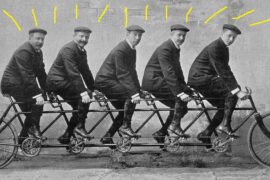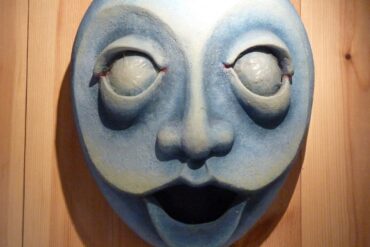The series Severance portrays and criticizes a dystopian-like workplace and focuses on themes like modern slavery. It shows a money-oriented world in which capitalists exploit and dehumanize workers to take the most profit by disregarding their human characteristics.
By Alican Albayrak
Have you ever felt like a big part of your life will be wasted in your workplace in anguish? Is your job like a sacred thing for other employees? Also, irrational, dogmatic, and fascistic, with its rules, laws, morality values, punishment, and reward system? Do your employers need you, or do they need a robot?
The 2022 Emmy Award winning series Severance is a psychological thriller that holds a black mirror to us. Throughout the series, the experiences of office workers who are tortured and oppressed over time are told with many allegories. The setting is not specifically mentioned, which gives it a dystopian feeling. It is set in a big company with retro-futuristic furnishings, long hallways and minimalist rooms. The audience can easily perceive what modern slavery looks like in this grotesque workplace. How would Marx react to this film, considering that the leading role’s name, Mark S., sounds similar to his?
Who Are You?
Tolstoy says: »All great literature is one of two stories; a man goes on a journey, or a stranger comes to town.« Okay, perhaps not to town, but the story of the series starts with a stranger: a new employee comes to the Lumon company. On her first day, she does not know who she is and where she is, like a babe in arms. Her memory is deleted from her mind. To decide whether she is ready, she is tested with some personal questions by the new manager of the Macrodata Refinement department, Mark.
Mark comes to work after he wipes his tears in his car. He leaves all emotions and feelings about his outside life and becomes ready for the workplace. He is like a cog in a machine after entering from the door of the building. He changes his clothes, wears a suit and a chain-like tie on his neck, leaves his identity behind, and becomes similar to other employees before another day of work in ›hell‹ begins.
The idea of controlling the employees’ memories in the series is simple yet thought-provoking. When the candidates consent, an implant is placed into their brains to manipulate their memories, which are severed between working and personal life. Innie (the working personality) and outie (the personality outside of the company) do not know anything about each other. Just as in Marx’s theory of »alienation from species« or »human nature«, the workers are never free from their working activity. It is an instinctual human need to work in a free, creative and productive way for psychological well-being. But the Innies, under capitalism, keep working on and on without stopping like a never-ending loop, a cycle of depression and meaninglessness.
About ›Hell‹
The place they are working in has no windows. It is not quite possible to know if it is day or night. Nothing is natural, everything is artificial; even the way they talk is robotic, with a sense of business formality. Besides, employees have to be very productive. That is why they are not allowed to see each other until they finish their job. Their job is to delete numbers on their monitors. None of the employees know the reason for this task, what the numbers mean, who they are working for. Neither do they need to use their creativity nor have any free will while working. This is reminiscent of Marx’s theory of the »worker’s alienation from the product«: The workers do not feel anything towards the product they produce, they do not have any claim over the working process and they cannot identify themselves with the product. In the end, the working process feels vain.
Those people are exploited not only physically but also mentally. Employees are busy with what is asked of them to do. Also, it is forbidden to visit other departments. The authorities divide the departments to rule easily. They know each other as evil: even the Optic and Design department employees think that Refiners are non-human creatures. In this way, they also experience Marx’s theory of »alienation from fellow men« because they are separated and become each other’s villains through dehumanization and lack of emotions.
The series pushes the audience to question if we are the ones who create our own hell or if it is the system that does so. All employees except the ones in security and management departments let the authorities put the chip into their heads to be controlled voluntarily. They want it because some might want to be away from the realities of the world. Others might want to live without knowing the things happening in the workplace. In this way, at least in the other eight hours, they can enjoy life without questioning it.
Control Mechanisms
In order to make the employees ›proper‹ ones, control mechanisms are performed by the orders of the company authorities. They keep dictating their rules and values through some soft and hard powers until the innies buckle down and obey all the rules. If they perform rebellious or ›inappropriate‹ behaviors, the security takes them to the Break Room or the Wellness Room. Each room functions differently and the aim is to ›cure‹ them in a way.
Kier is the company’s founder, and he, as a figure, can also be considered a soft power that works as an illusionary fulfilment. Through the idea of Kier, authorities impose beliefs on those who seek meaning in their lives because they relieve themselves by saying, »We serve Kier.« Kier is a god-like figure for the employees. Those people do not see him but learn about him from each other and mostly the authorities. Sometimes a ›pilgrimage‹ is arranged to the Perpetuity Wing, where Kier is worshipped.
Rebellion
Most innies behave and think like outies until they open their mind. They do not care about their enslavement because they prefer to believe the company’s lies as an escape mechanism from the painful truths of the system. However, as a daughter of the company employee puts it:
»Do you ever think that maybe the best way to deal with a fucked-up situation in your life is not to just shut your brain off half the time?«
Severance is a clever commentary on late capitalist work ethics, not only in the United States, but everywhere. Many theories can be applied and can help the audience question some crucial topics with beautiful quotes like »Should you find yourself confronting a system, dear reader, stop and ask if it’s truly you that must change or the system«. Also, the series hosts renowned actors and actresses such as Christopher Walken, Patricia Arquette, and John Turturro. Surprisingly, Ben Stiller directed this series, showing his talent at another genre than comedy. Besides, the series offers perfect cinematography as well as a catchy and mysterious soundtrack composed by Theodore Shapiro which might give your ›outie‹ a kind of »Wellness« session.






